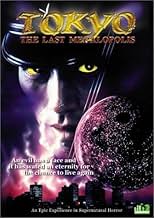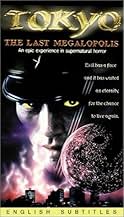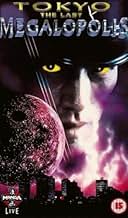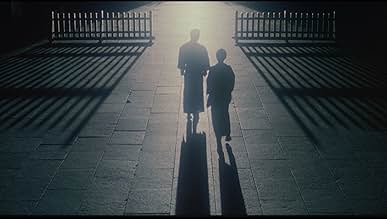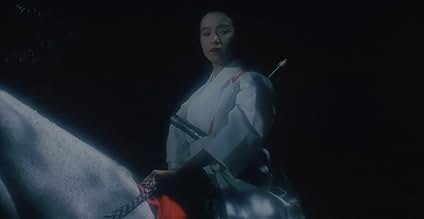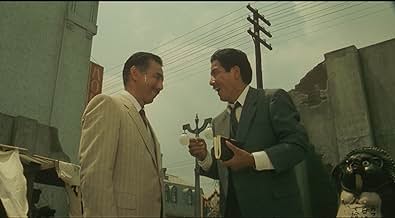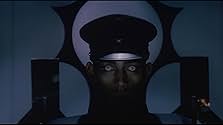A demonic reincarnation of a Japanese general from the 10th century appears in the early 20th century Tokyo with a mission to destroy the blooming city.A demonic reincarnation of a Japanese general from the 10th century appears in the early 20th century Tokyo with a mission to destroy the blooming city.A demonic reincarnation of a Japanese general from the 10th century appears in the early 20th century Tokyo with a mission to destroy the blooming city.
- Director
- Writers
- Stars
- Awards
- 2 nominations total
Jun'ichi Ishida
- Yoichiro Tatsumiya
- (as Junichi Ishida)
Bunshi Katsura VI
- Shigemaru Kuroda
- (as Sanshi Katsura)
Tamasaburô Bandô
- Kyoka Izumi
- (as Tamasaburo Bando)
- Director
- Writers
- All cast & crew
- Production, box office & more at IMDbPro
Featured reviews
First of all, this review is for the live-action film, not the anime one. The anime one was made in 1991.
Before I begin, I just want to acknowledge that this is a VERY confusing movie and difficult to recommend to average English viewers. It's based on an extremely long and complicated novel released only in Japan known as "Teito Monogatari" ("Tale of the Imperial Capital") by a scholar Hiroshi Aramata. The original novel is basically a huge retelling of the history of Tokyo from the turn of the century all the way up to the next millennium, but done from an occultist viewpoint. It was notable for being a pioneer of the "fantasy occult boom" that dominated Japanese pop culture in the late 80's and early 90's and was hugely influential (see the ONMYOJI films, which were based on books written in the wake of this novel's popularity).
The novel is composed of 12 volumes each around 250--500 pages in length. But that's not all. There is an unofficial 13th volume which serves as a side story (and was also made into a movie). Is that it? No. There are also prequel, several spin-off works (such as THE GREAT YOKAI WAR, made into a film by Takaashi Miike) and "series analysis" books, and a another huge retelling in the form of "Shin Teito Monogatari" ("New Tale of the Capital"). So yeah...this series has its roots in Japanese literature far more than it does in films.
The movie is very ambitious in that it attempts to adapt the first four books of the series (1000 pages covering 20 years of history) to the screen in only a 2.5 hour time span! So if the story feels like it's moving along too fast; it's because there's WAY too much ground to cover. For example the characters that populate the story will not have much identity unless you know their historical origins (many of them are based on real famous people who lived during that time period) and their roles in the original novel.
The main problem is the film is that it wants to be a profoundly entertaining blockbuster, but doesn't know how to properly balance the exposition and entertainment value. From the moody overblown intro sequence with its stirring Wagner-esque orchestral score to the explosive pyrotechnics filled finale, it's clear the movie was looking to cash in on big budget Hollywood SPFX extravaganzas like ALIENS and POLTERGEIST. But the source material it's adapting is extremely dense and simply unfit for such a production. The world the story is creating is too big, and the film simply does not give enough time or background introducing the audience into it. The only way this movie can be really enjoyed is as a supplement to the original novel, but since that has never been translated, English speakers are kind of screwed. And despite the budget, the SPFX also really need some refinement too; even for the time, some of the effects were terribly primitive. Thus, I cannot lie, but to many people the movie simply will NOT be a satisfying experience.
But I love it.
For one thing, it's a unique film. Many of the guys responsible for this flick also were responsible for other classic J-horror and Japanese SPFX flicks, but here they're dealing with something quite different. Although advertised as a horror flick by ADV's misleading promotional material, I should point out it's really a genre-bender of a movie: a horror, fantasy, science fiction, and historical fiction film all at once. Thus you get a few scares, a lot of whimsical fantasy, and even some education to boot.
Second of all, it's a visually absorbing film. A lot of money was spent on this movie, and that's no more apparent than the meticulously constructed costumes and sets (an entire 150 meter avenue was reconstructed, buildings, people, cars and all, for use in the movie). The movie just goes to great lengths to recreate Tokyo as it was during the 1920's.
I'm also quite serious about the parallels I find with this film and John Boorman's Excalibur--both are fantasy films helmed by directors with uneven track records and stylistic eccentricities (John Boorman and Akio Jissoji), both feature epic stories which take place over several years, both feature some great classical actors (Nicol Williamson, Patrick Stewart, Shintaro Katsu, Ko Nishimura, etc.) in primary and supporting roles, both films have make heavy use of classical music for key dramatic points, both feature stories which are darker modern representations of classic mythology, and both are visually sumptuous, romanticized views of the past.
The horror is borrowed from classic vampire movies such as F.W. Murnau's NOSFERATU and the Hammer films. There is also some influence from more modern supernatural thrillers such as EXORCIST. Kyusaku Shimada, the actor who plays the main villain, became famous overnight due to his performance here. Imagine Christopher Lee's "Dracula" with a monstrous chin and bodily movements reminiscent of Max Schreck and you will get something akin to his portrayal of the villain in this movie.
And apparently I wasn't alone. The movie itself was a box office hit in Japan when in it was released. Some magazines even went so far as to call it the "best Japanese science fiction production of all time" (wow...) Many contemporary stars of Japanese cinema got their start here and owe a lot to this movie.
But that doesn't translate into immediate recommendation over here. For various reasons (especially the lack of the source material's availability), the film is quite difficult to recommend to Westerners and I would not pressure anyone to watch it.
On the other hand, if you want something different...an uneven historical fantasy epic that challenges you with an overabundance of modern Japanese history and classic Japanese (and Chinese) folklore references, then by all means give this film a try. :)
Before I begin, I just want to acknowledge that this is a VERY confusing movie and difficult to recommend to average English viewers. It's based on an extremely long and complicated novel released only in Japan known as "Teito Monogatari" ("Tale of the Imperial Capital") by a scholar Hiroshi Aramata. The original novel is basically a huge retelling of the history of Tokyo from the turn of the century all the way up to the next millennium, but done from an occultist viewpoint. It was notable for being a pioneer of the "fantasy occult boom" that dominated Japanese pop culture in the late 80's and early 90's and was hugely influential (see the ONMYOJI films, which were based on books written in the wake of this novel's popularity).
The novel is composed of 12 volumes each around 250--500 pages in length. But that's not all. There is an unofficial 13th volume which serves as a side story (and was also made into a movie). Is that it? No. There are also prequel, several spin-off works (such as THE GREAT YOKAI WAR, made into a film by Takaashi Miike) and "series analysis" books, and a another huge retelling in the form of "Shin Teito Monogatari" ("New Tale of the Capital"). So yeah...this series has its roots in Japanese literature far more than it does in films.
The movie is very ambitious in that it attempts to adapt the first four books of the series (1000 pages covering 20 years of history) to the screen in only a 2.5 hour time span! So if the story feels like it's moving along too fast; it's because there's WAY too much ground to cover. For example the characters that populate the story will not have much identity unless you know their historical origins (many of them are based on real famous people who lived during that time period) and their roles in the original novel.
The main problem is the film is that it wants to be a profoundly entertaining blockbuster, but doesn't know how to properly balance the exposition and entertainment value. From the moody overblown intro sequence with its stirring Wagner-esque orchestral score to the explosive pyrotechnics filled finale, it's clear the movie was looking to cash in on big budget Hollywood SPFX extravaganzas like ALIENS and POLTERGEIST. But the source material it's adapting is extremely dense and simply unfit for such a production. The world the story is creating is too big, and the film simply does not give enough time or background introducing the audience into it. The only way this movie can be really enjoyed is as a supplement to the original novel, but since that has never been translated, English speakers are kind of screwed. And despite the budget, the SPFX also really need some refinement too; even for the time, some of the effects were terribly primitive. Thus, I cannot lie, but to many people the movie simply will NOT be a satisfying experience.
But I love it.
For one thing, it's a unique film. Many of the guys responsible for this flick also were responsible for other classic J-horror and Japanese SPFX flicks, but here they're dealing with something quite different. Although advertised as a horror flick by ADV's misleading promotional material, I should point out it's really a genre-bender of a movie: a horror, fantasy, science fiction, and historical fiction film all at once. Thus you get a few scares, a lot of whimsical fantasy, and even some education to boot.
Second of all, it's a visually absorbing film. A lot of money was spent on this movie, and that's no more apparent than the meticulously constructed costumes and sets (an entire 150 meter avenue was reconstructed, buildings, people, cars and all, for use in the movie). The movie just goes to great lengths to recreate Tokyo as it was during the 1920's.
I'm also quite serious about the parallels I find with this film and John Boorman's Excalibur--both are fantasy films helmed by directors with uneven track records and stylistic eccentricities (John Boorman and Akio Jissoji), both feature epic stories which take place over several years, both feature some great classical actors (Nicol Williamson, Patrick Stewart, Shintaro Katsu, Ko Nishimura, etc.) in primary and supporting roles, both films have make heavy use of classical music for key dramatic points, both feature stories which are darker modern representations of classic mythology, and both are visually sumptuous, romanticized views of the past.
The horror is borrowed from classic vampire movies such as F.W. Murnau's NOSFERATU and the Hammer films. There is also some influence from more modern supernatural thrillers such as EXORCIST. Kyusaku Shimada, the actor who plays the main villain, became famous overnight due to his performance here. Imagine Christopher Lee's "Dracula" with a monstrous chin and bodily movements reminiscent of Max Schreck and you will get something akin to his portrayal of the villain in this movie.
And apparently I wasn't alone. The movie itself was a box office hit in Japan when in it was released. Some magazines even went so far as to call it the "best Japanese science fiction production of all time" (wow...) Many contemporary stars of Japanese cinema got their start here and owe a lot to this movie.
But that doesn't translate into immediate recommendation over here. For various reasons (especially the lack of the source material's availability), the film is quite difficult to recommend to Westerners and I would not pressure anyone to watch it.
On the other hand, if you want something different...an uneven historical fantasy epic that challenges you with an overabundance of modern Japanese history and classic Japanese (and Chinese) folklore references, then by all means give this film a try. :)
"Teito monogatari," directed by Akio Jissoji in 1988, is a supernatural horror film that delves deep into the dark underbelly of Tokyo's history and urban legends. The film, based on a novel by Hiroshi Aramata, is a sprawling epic that spans decades and intertwines history, folklore, and supernatural elements. Despite its ambitious narrative and unique blend of genres, "Teito monogatari" falls short in some aspects.
The cinematography by Shoji Ueda is one of the film's strongest aspects, capturing the stark contrast between Tokyo's bustling modernity and its hidden, darker side. The cityscape is beautifully shot, with a haunting atmosphere that permeates the film. The special effects, while dated by today's standards, are still effective in creating a sense of otherworldly terror.
"Teito monogatari" has had a lasting impact on Japanese cinema, particularly in the horror and supernatural genres. Its exploration of Tokyo's dark history and urban legends has inspired numerous films and stories, making it a significant cultural artifact. However, the film's convoluted plot and uneven acting prevent it from achieving true greatness.
In conclusion, "Teito monogatari" is a fascinating, albeit flawed, exploration of Tokyo's supernatural underworld. With its intriguing plot, standout performances from its lead actors, and haunting cinematography, the film is worth watching for fans of horror and supernatural cinema. However, be prepared for a complex and, at times, confusing narrative that may leave you searching for answers.
The cinematography by Shoji Ueda is one of the film's strongest aspects, capturing the stark contrast between Tokyo's bustling modernity and its hidden, darker side. The cityscape is beautifully shot, with a haunting atmosphere that permeates the film. The special effects, while dated by today's standards, are still effective in creating a sense of otherworldly terror.
"Teito monogatari" has had a lasting impact on Japanese cinema, particularly in the horror and supernatural genres. Its exploration of Tokyo's dark history and urban legends has inspired numerous films and stories, making it a significant cultural artifact. However, the film's convoluted plot and uneven acting prevent it from achieving true greatness.
In conclusion, "Teito monogatari" is a fascinating, albeit flawed, exploration of Tokyo's supernatural underworld. With its intriguing plot, standout performances from its lead actors, and haunting cinematography, the film is worth watching for fans of horror and supernatural cinema. However, be prepared for a complex and, at times, confusing narrative that may leave you searching for answers.
Legendary Japanese director Akio Jissoji's quite literally ground-breaking, brain-boggling 'Teito Monogatari' aka 'Tokyo - The Last Megalopolis' is a breathtakingly imaginative Japanese Sci-fi fantasy epic about the ancient malevolent spirit of Taira No Masakado, a truly terrible, awesomely powerful spirit fitfully interred beneath an ever-expanding Tokyo, this vile despotic entity damned for heinous crimes against humanity, its alien slumbering being dangerously disturbed by no less maniacal demon psychic Yasunori Kato (Kyusako Shimada), whose unspeakably malign plan to rouse this monstrous being, and desolate Tokyo can only be thwarted by benign magic of beautiful metaphysical warrior Tatsumiya Keiko (Mieko Harada).
Seamlessly incorporating a dazzling array of special effects, featuring especially dextrous hand puppetry, vivid animatronic illusions, sublime stop-motion animation, and some striking, idiosyncratic designs by H. R Giger! And the committed, rousingly grandiose performances by a talented cast add considerable lustre to the story's thrilling vibrancy. Akio Jissoji's bravura, big budget, delightfully imaginative, Bava-esque Sci-fantasy has lost none of its elemental power to enthral, defy expectations, and exhilaratingly transport the ceaselessly agog viewer into maestro Akio Jissoji's surrealistically scintillating, weirdly immersive crypto-history of the eerily fascinating, supernaturally shattered, and triumphant resurrection of this mythical Tokyo metropolis! A tremendously worthy success on its initial release, the spectacular 'Teito Monogatari' spawned two sequels!
Rabid film fact fans may like to know that visionary director Akio Jissoji also masterminded the successful resurrection of popular hyper-kinetic superhero 'Ultra Man' in his dynamic 'The Return of Ultraman' TV series (71-74)!
Seamlessly incorporating a dazzling array of special effects, featuring especially dextrous hand puppetry, vivid animatronic illusions, sublime stop-motion animation, and some striking, idiosyncratic designs by H. R Giger! And the committed, rousingly grandiose performances by a talented cast add considerable lustre to the story's thrilling vibrancy. Akio Jissoji's bravura, big budget, delightfully imaginative, Bava-esque Sci-fantasy has lost none of its elemental power to enthral, defy expectations, and exhilaratingly transport the ceaselessly agog viewer into maestro Akio Jissoji's surrealistically scintillating, weirdly immersive crypto-history of the eerily fascinating, supernaturally shattered, and triumphant resurrection of this mythical Tokyo metropolis! A tremendously worthy success on its initial release, the spectacular 'Teito Monogatari' spawned two sequels!
Rabid film fact fans may like to know that visionary director Akio Jissoji also masterminded the successful resurrection of popular hyper-kinetic superhero 'Ultra Man' in his dynamic 'The Return of Ultraman' TV series (71-74)!
"Teito monogatari" is one of the best Japanese movies in history, based on the novel of the same name, the script achieves a perfect dark fantasy and horror story, which is made up of historical elements mixed with folklore and mythology. The performances are outstanding, the production design is first class, the soundtrack is hypnotizing and the special effects are a complete success, obviously with all the 80's charm of the stop-motion technique to bring various creatures to life, it is also noticeable the influence of Ray Harryhausen in different designs. A classic that encompasses various film genres!
In the realm of Japanese cinema, Teito monogatari (1988) stands as a thought-provoking and visceral exploration of the intricacies of human existence.
Teito monogatari weaves a tapestry of interconnected narratives, each thread unveiling the lives of individuals navigating the gritty underbelly of Tokyo's urban landscape. From a disillusioned salaryman grappling with existential despair to a sex worker yearning for genuine connection, the film fearlessly delves into the raw, unvarnished realities that often go unspoken. Kuroki's storytelling is unapologetic, offering no easy resolutions or moral absolutes, but rather a poignant exploration of the human condition in all its complexities.
Teito monogatari's visual language is a testament to Kuroki's artistic vision. The film's cinematography is gritty and unflinching, capturing the stark beauty and harsh realities of Tokyo's urban landscape with equal reverence. From the neon-drenched streets to the claustrophobic confines of tiny apartments, the camera's lens serves as an uncompromising witness, refusing to shy away from the raw and visceral.
Teito monogatari is a film that lingers long after the credits roll. Its impact lies not in offering tidy resolutions or feel-good moments, but in its unflinching exploration of the human condition in all its messy, complicated glory. While not without its flaws - the film's pacing can feel uneven at times, and certain subplots could have been better developed - Teito monogatari ultimately succeeds in its ambition to hold a mirror to society, forcing viewers to confront the harsh truths that often go unacknowledged.
In a cinematic landscape where superficial narratives often reign supreme, Teito monogatari stands as a refreshing and courageous work of art. It may not be a film for the faint of heart, but for those willing to embrace its stark realism and uncompromising vision, it offers a profoundly moving and thought-provoking experience.
Teito monogatari weaves a tapestry of interconnected narratives, each thread unveiling the lives of individuals navigating the gritty underbelly of Tokyo's urban landscape. From a disillusioned salaryman grappling with existential despair to a sex worker yearning for genuine connection, the film fearlessly delves into the raw, unvarnished realities that often go unspoken. Kuroki's storytelling is unapologetic, offering no easy resolutions or moral absolutes, but rather a poignant exploration of the human condition in all its complexities.
Teito monogatari's visual language is a testament to Kuroki's artistic vision. The film's cinematography is gritty and unflinching, capturing the stark beauty and harsh realities of Tokyo's urban landscape with equal reverence. From the neon-drenched streets to the claustrophobic confines of tiny apartments, the camera's lens serves as an uncompromising witness, refusing to shy away from the raw and visceral.
Teito monogatari is a film that lingers long after the credits roll. Its impact lies not in offering tidy resolutions or feel-good moments, but in its unflinching exploration of the human condition in all its messy, complicated glory. While not without its flaws - the film's pacing can feel uneven at times, and certain subplots could have been better developed - Teito monogatari ultimately succeeds in its ambition to hold a mirror to society, forcing viewers to confront the harsh truths that often go unacknowledged.
In a cinematic landscape where superficial narratives often reign supreme, Teito monogatari stands as a refreshing and courageous work of art. It may not be a film for the faint of heart, but for those willing to embrace its stark realism and uncompromising vision, it offers a profoundly moving and thought-provoking experience.
Did you know
- TriviaSwiss artist H. R. Giger, best known for his work on Ridley Scott's ALIEN, contributed concept art for the film. He originally showed interest in working on set, however his schedule would not permit it.
- Quotes
Eichi Shibusawa: Both destruction and growth repeat endlessly by devouring people's lives. Even so, people flock to the city. Nobody can stop them.
[subtitled version]
- ConnectionsFollowed by Teito taisen (1989)
- How long is Tokyo: The Last Megalopolis?Powered by Alexa
Details
- Release date
- Country of origin
- Official site
- Language
- Also known as
- Tokyo: The Last Megalopolis
- Production company
- See more company credits at IMDbPro
- Runtime
- 2h 15m(135 min)
- Color
Contribute to this page
Suggest an edit or add missing content


